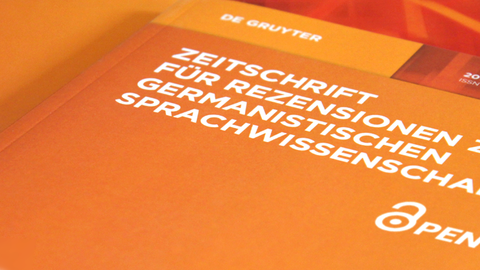Our research
In addition to teaching in undergraduate, graduate, and continuing education programs, our activities focus on a variety of research topics, including both theoretical and applied issues.
 © CC-BY
© CC-BY
Language and language knowledge as an object of research
Current research projects
"DigitalHerrnhut" in "virTUos" (virtual teaching and learning at TU Dresden in an open source context). Foundation for Innovation in University Teaching // "Strengthening university teaching through digitalization". 01.08.2020 to 31.12.2025
In DigitalHerrnhut, both innovative virtual and hybrid teaching and event formats are (further) developed and internationalized. Specifically, small modular curricula are being virtualized and anchored in the curriculum following DigitaLiS for the Master's degree course in Digital Humanities with international partners (e.g. Bucknell University, Pennsylvania). For Digital Herrnhut, innovative enhancements are being implemented through virtual excursions, workshops and conferences involving culturally relevant locations in Eastern Saxony (Herrnhut/Berthelsdorf, Kleinwelka, Niesky). VR/AR technologies will be used for this purpose. The project is supported by the SLUB.
TUD-COIIIL is one of 48 projects selected by the DAAD for its "International Virtual Academic Collaboration" program. The Federal Ministry of Education and Research is funding the projects with around 5.5 million euros until the end of 2021. The central aim is to test the possibilities of collaborative learning in hybrid learning environments. In the linguistics sub-project, a cooperation with Bucknell, P.A., has been initiated in the context of the plans for the Master's degree in Digital Humanities. Virtual mobility modules will be anchored in this in the context of the work on DigitalHerrnhut.
Integrated Digital Sorbian Studies (IDSS)
The third-party funded project, which will run from 2022 to around 2027, is being carried out by the Sorbian Institute (Prof. Dr. Hauke Bartels) together with TU Dresden (Prof. Dr. Christian Prunitsch, Slavic Studies and Prof. Dr. Alexander Lasch, German Studies). It combines a framing strategic measure, the embedding of Sorbian Studies (a) in larger subjects (Slavic Studies, German Studies) and (b) in overarching developments in the humanities (development of Digital Humanities) with concrete individual projects. Their results should also serve the above-mentioned embedding or otherwise strengthen interest in the "small subject" of Sorbian Studies. The project is part of the funding program "Weltwissen. Strukturelle Stärkung kleiner Fächer" funding program with approx. 990 thousand euros from the Volkswagen Foundation. With contributions from TUD and SI, the total financial volume amounts to around 1.6 million euros.
The network of idiomatic constructions: A quantitative and corpus-based approach
The project "The network of idiomatic constructions: A quantitative and corpus-based approach" brings together researchers from Germany and Taiwan to analyze idiomatic constructions in Chinese, especially four-character idioms (chengyu), within the framework of construction grammar. The focus is on the question of how these idiomatic patterns are organized as form-meaning pairs in linguistic networks and what role semantic, prosodic and iconic factors play in their structuring and productivity.
The project pursues two goals: First, using large corpus data and quantitative methods such as collostruction analysis, underlying construction schemes will be identified, their semantic relationships recorded and their productivity evaluated. Secondly, the feasibility of a Chinese "Constructi-i-con" - a comprehensive network of idiomatic constructions - will be tested. The expertise of the Taiwanese partner in the field of distributional semantics and network analysis will be combined in a targeted manner with cognitive-linguistic and construction-grammatical perspectives.
The cooperation is geared towards reciprocal research visits and joint training activities: Workshops on computational linguistic methods at TU Dresden as well as teaching and research contributions in Taiwan. The project thus not only contributes to the further theoretical development of construction grammar, but also lays the foundation for a long-term scientific partnership between Germany and Taiwan in the field of cognitive and computational linguistic idiom research.
The project "The network of idiomatic constructions: A quantitative and corpus-based approach" brings together researchers from Germany and Taiwan to analyze idiomatic constructions in Chinese, especially four-character idioms (chengyu), within the framework of construction grammar. The focus is on the question of how these idiomatic patterns are organized as form-meaning pairs in linguistic networks and what role semantic, prosodic and iconic factors play in their structuring and productivity.
The project pursues two goals: First, using large corpus data and quantitative methods such as collostruction analysis, underlying construction schemes will be identified, their semantic relationships recorded and their productivity evaluated. Secondly, the feasibility of a Chinese "Constructi-i-con" - a comprehensive network of idiomatic constructions - will be tested. The expertise of the Taiwanese partner in the field of distributional semantics and network analysis will be combined in a targeted manner with cognitive-linguistic and construction-grammatical perspectives.
The cooperation is geared towards reciprocal research visits and joint training activities: Workshops on computational linguistic methods at TU Dresden as well as teaching and research contributions in Taiwan. The project thus not only contributes to the further theoretical development of construction grammar, but also lays the foundation for a long-term scientific partnership between Germany and Taiwan in the field of cognitive and computational linguistic idiom research.
Frame and metaphor
The planned teaching project combines innovative language didactic formats with current cognitive-linguistic research on metaphor and frame. The starting point is the observation that key social issues - such as sustainability, digitalization or migration - are communicated to a large extent metaphorically and frame-based. These linguistic patterns shape not only public debates, but also individual understanding and action. Nevertheless, there has been a lack of systematic formats in university teaching that sensitize students to the discursive power of metaphors and frames and at the same time provide them with methodological tools for critical analysis.
The project therefore pursues two central goals: (1) the development and testing of innovative teaching formats in which students independently examine metaphorical and frame-based structures in socially relevant discourses, and (2) the documented reflection of these formats as a contribution to linguistic didactic enlightenment. Didactically, the focus is on research-based learning: students work with current corpora, multimodal discourse materials and digital analysis tools, try out methods of metaphor analysis and frame semantics and present their results in a practice-oriented final workshop.
The added value of the project lies in the close integration of research and teaching. On the one hand, students gain insights into highly topical linguistic approaches and acquire analytical skills that they can use in their studies, careers and social practice. On the other hand, the project contributes to the development and visualization of innovative teaching methods in the field of cognitive linguistics and discourse analysis. The results are documented in a best-practice article and serve as an impulse for the curricular development of linguistic teaching.
Construction-grammatical and usage-based teaching of idiomatic constructions - an empirical study in GFL lessons for beginners in a Chinese foreign language school
The research project investigates how principles of cognitive construction grammar and frame semantics can be used didactically for teaching German in China. The starting point is the assumption that language is not acquired through the separate mediation of form and meaning, but through use in authentic contexts. In traditional teaching, idiomatic constructions in particular, which convey complex cultural and intercultural knowledge, have so far mostly been treated in isolation and with a focus on examinations. As a result, their contextual functions and their cultural added value often remain invisible.
The project aims to increase the learning efficiency and cultural awareness of students by systematically teaching idiomatic constructions within the framework of a usage-oriented methodology. The study will be conducted with 35 Chinese learners of German (grades 7-9, CEFR level A1) at a foreign language school. Two groups with comparable language profiles will be randomly divided: The control group receives traditional instruction, while the experimental group works with construction grammar and frame-based materials that also incorporate cultural contexts.
The effect is examined using pre- and post-tests, participant observation, surveys and interviews. The project thus makes an innovative contribution to the empirical foundation of language didactic concepts and opens up new perspectives for the use of cognitive construction grammar in the international GFL context.
Fields of research
In our research, we focus on the question of how language, language structure, language action, language use and language knowledge can be described in the past and present in a way that is adequate to the subject matter and explanation. Our most important fields of research are (links lead directly to the "GLS" blog):
- Construction grammar of German
- Historical linguistics
- Dialect geography of Upper Saxon
- Language and religion
- Pragmatics
- Corporate communication
- Barrier-free communication
Just like the research fields, we also publish references to current work, contributions, lecture scripts and presentations as well as recordings of lectures in the "Research" category on our blog "GLS", which we manage collaboratively.
Completed research projects
"Mapping Moravian Meanings" in "TUD-COIIIL" (collaborative online international, interdisciplinary, intercultural learning). DAAD // "International Virtual Academic Collaboration". Federal Ministry of Education and Research. 01.10.2020 to 30.09.2021.
Marlene Rummel
CLiC (Conceptualizing Languages in Colonization). DAAD // "International Virtual Academic Collaboration". Federal Ministry of Education and Research. 01.10.2021 to 30.09.2022.
Marlene Rummel
"Linguistic Knowledge Transfer Processes (TUD-GL)" in KEEN (Artificial Intelligence Incubator Labs in the Process Industry).
Svenja Lammers




